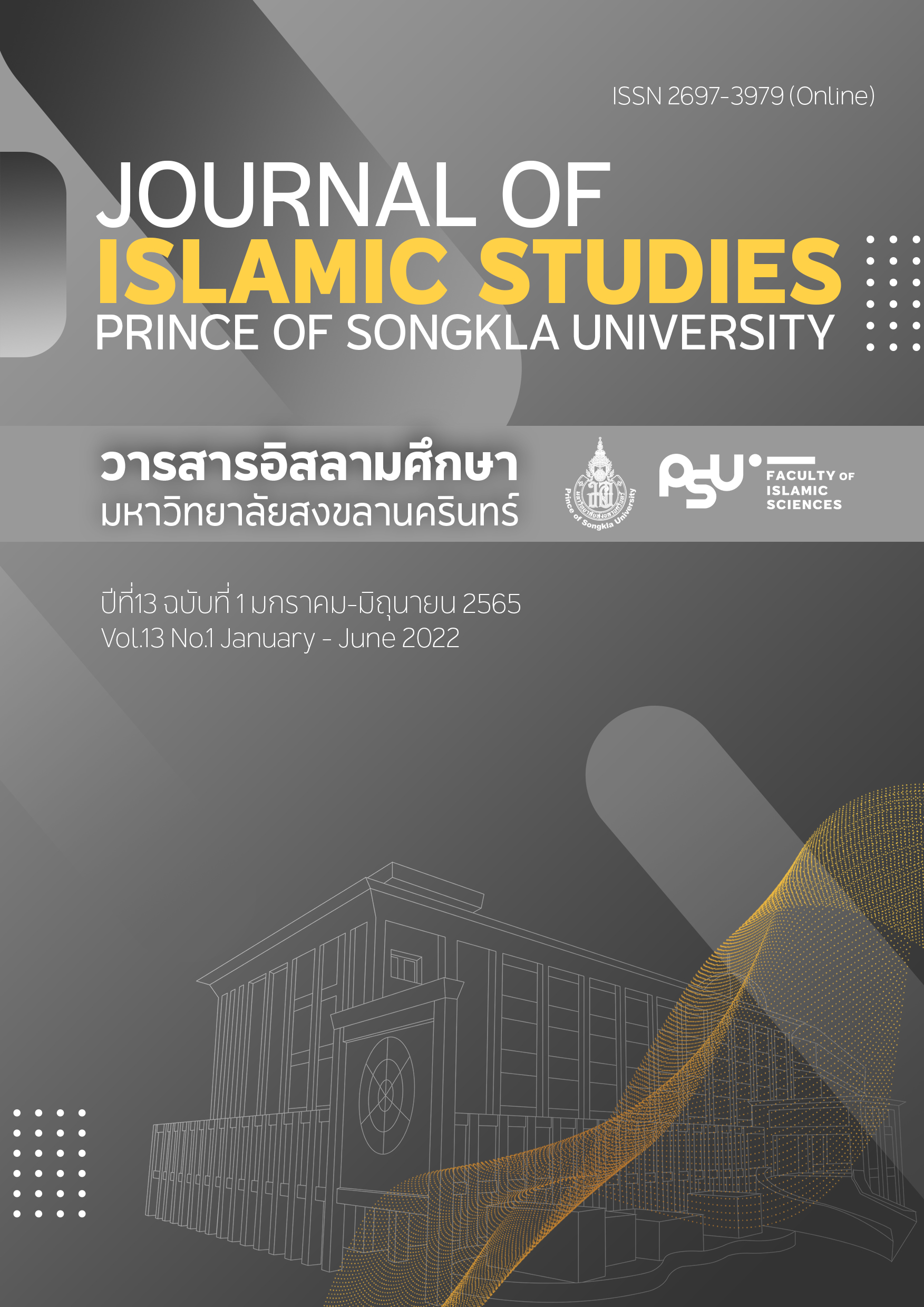State Multiculturalism and Multiculturalism of the Melayu Muslims: A case study of the dialogue on the Idea of Multiculturalism in Southern Thailand
Keywords:
Multiculturalism, Ulama, Malayu Muslims Patani, National Security PolicyAbstract
Objective This article aims at studying the two keys issues: 1) To investigate the concept of multiculturalism as understood, and employed by the Thai authority as state’s policy to solve problems of the unrest in the three provinces of southern Thailand, which are reflected in the National Security Policy’s papers and other related documents. The study focuses on the understandings of multiculturalist idea by state officers who implement those policy 2) To study on how multiculturalism is understood, interpreted and re-interpreted by the Malay Muslims in the three southern provinces of Thailand, particularly, by those of Islamic learned men (ulama), local leaders of a civil society organizations (CSOs), and their response to the pursuing of multicultural policy by the Thai state.
Methodology Qualitative research employing documentary as well as keys informant’s in-depth interview. Texts analysis was utilized to compare and relating data in order to meet the objectives of the research.
Research findings The study found that the Thai authority utilizes the concept of multiculturalism as a tool so that cultural diversity is managed and controlled under the Thai state, the emphasize was placed at the Buddhists and the Muslims to live together. The understanding of multiculturalism by the Thai state is inherently flaws as it avoids addressing structural problems, particularly, that of the issue of power. The indigenous intellectuals and local CSOs argue that if the Thai is really serious about multiculturalism it must be implement the policy of power sharing and decentralization so that to give local people to be able to manage their own affairs, particularly, as regards to natural resources. In addition, multiculturalism is interpreted differently among Islamic learned men, depends on their affiliation to school of thoughts, however, all have agreed that the main idea is to respect differences in religious beliefs and practices.
Contributions: Multiculturalism as understood by different sectors of the society be it state, people, religious learned men, and the CSOs, according to this research can be shared by one another in order to bridge the gap among those sectors. The state in particular can appropriate the findings to correct their implementation of the multicultural policy in southern Thailand.
References
Azra, A. (2004). The Origins of Islamic Reformism in Southeast Asia: Networks of Malay-Indonesian and Middle Eastern Ulama in the seventeenth and eighteenth centuries. University of Hawai’I Press.
Che Man, W. K. (1983). Muslim Elites and Politics in Southern Thailand. MA. Universiti Sains Malaysia.
Duncan, M. (2008). Tearing Apart the Land: Islam and Legitimacy in Southern Thailand. Cornell University Press.
Ibrahim, A. (2014). Contemporary Islamic Discourse in the Malay-Indonesian World: Critical Perspectives. Strategic Information and Research Development Center.
James, W. (2008). A Pluralistic Universe, Ed. H.G. Callaway. Cambridge Scholars Publishing.
Kymlicka, W. (2007). Multicultural Odysseys: Navigating the New International Politics of Diversity. Oxford University Press.
Matheson, V., & Hooker, M.B. (1998). Jawi Literature in Patani: The Maintenance of an Islamic Tradition. JMBRAS. (61). 2-24.
Parnikkar, R. (1995). Philosophical Pluralism and the Plurality of Religions. Religious Pluralism and Truth. State University of New York Press.
Troll, C. W. (1999). The Claims of religious truth and socio-political pluralism. One World for All: Foundation of a Socio-Political and Cultural Pluralism from Christian and Muslim Perspectives. Vikas.
Yahprung, A. (2014). Islamic Reform and Revivalism in Southern Thailand: A Critical Study of the Salafi Reform Movement of Shaykh Dr. Ismail Lutfi Chapakia Al-Fatani, 1986–2010. International Islamic University.
Srigate, G. (2018). Political analysis according to the concept of multiculturalism. Sukhothai Thammathirat Open University.
Editorial department (2017). Reflections on Multicultural Concepts and Strategies for Resolving Unrest in the Southern Border Provinces. Patani Forum, 3(22), 8.
Satha-Anand, C. (2007). Social Integration and State Security Issues: Remarks on the Case of the Four Southern Provinces, Thailand. The Origin of Southern Fire. Chulalongkorn University Press.
Uppama, T., & Suetair, A. (2021). Ummah Wasat – The Middle Nation: The concept of human civilization emplacement in Islam. Journal of Islamic Studies, Prince of Songkla University, 12(2), 16–28. Retrieved from https://so03.tci-thaijo.org/index.php /JOIS/article/view/254732
Wasi, P. (2005). Policy implementation process to solve problems in the southern border provinces sustainably. Research report to submit to the Office of the National Research Council of Thailand.
Sirisakdamkoeng, P. (2003). Interaction between Malay Muslims and Chinese in the Central District, Yala Province. Faculty of Archaeology, Silpakorn University.
Salaeh, R. (2001). Interactions between religions appearing in Pattani, Yala and Narathiwat Provinces. Research Fund Office.
Sunanta, S. (2556). Learning from the west? The state of the multicultural debate in Thailand. Journal of Language and Culture, 32(1), 4-22.
Sattayanurat, S. (2002). Thai Nationality and Thainess by Luang Wichitwathakan. Matichon Publishing House.
Sattayanurat, S. (2014). 10 Siamese intellectuals: intellectuals after the 1932 revolution (eds 2). Openbooks.
Office of the National Security Council. (2017). Administrative Policy and Development of Southern Border Provinces 2017 – 2019. Cabinet Publishing and Government Gazette.
Saengchai, A (2018). Multiculturalism and the Controversy about Gender and Religious Ways. In Ekarin Tuansiri (Editor), Multicultural Perspectives. (p. 106-123). Patani Forum.
Kanchanaphan, A (2018). Multiculturalism in the context of transition. In Ekarin Tuansiri (Editor), Multicultural Perspectives. (p. 2-35). Bangkok: Patani Forum.
Japaqiya, I. (2011) Islam Religion of Peace. Asslam Institute.
Tuansiri, E. (2018). Multicultural Policy in Southern Border Provinces. In Ekarin Tuansiri (Editor), Multicultural Perspectives. (p. 82-105). Patani Forum.
Downloads
Published
How to Cite
Issue
Section
License
Copyright (c) 2022 Journal of Islamic Studies, Prince of Songkla University

This work is licensed under a Creative Commons Attribution 4.0 International License.
All articles Published in The Journal of Islamic Studies are author’s opinions, and not the responsibility of the Faculty of Islamic Sciences nor the editorial board. However any citation should be referred to the journal.
















